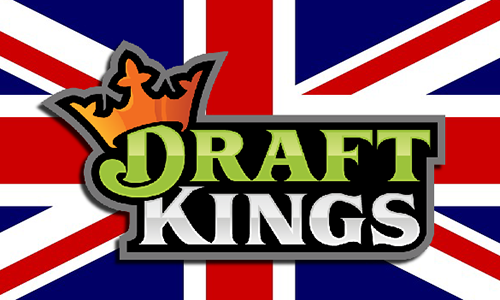DraftKings Launches DFS Site in United Kingdom
As daily fantasy sports (DFS) sites continue to run into legal brick walls in the United States, one has taken a step to skirt those walls altogether by turning elsewhere for customers. On Friday, February 5th, DFS leader DraftKings launched its popular service in the United Kingdom, aiming to secure a safer revenue stream in a regulated market.
The offerings are largely the same as they are in the United States. Players can construct lineups for eight different sports: American football, football (soccer), PGA Tour golf, mixed martial arts, basketball, baseball, NASCAR, and ice hockey. Of course, in the UK, the focus is clearly on soccer, with three leagues available for contests: Premier League, Champions League, and the United States’ Major League Soccer.
 In an interview with WIRED, DraftKings chief international offer (CIO) Jeffrey Haas said, “We’re under no illusion that our top three sports here won’t be anything else than football, football and football.”
In an interview with WIRED, DraftKings chief international offer (CIO) Jeffrey Haas said, “We’re under no illusion that our top three sports here won’t be anything else than football, football and football.”
Let’s just be clear, as noted in the sports list, in this article, “football” means soccer. If we talk about the “hand-egg” season that just ended with the Denver Broncos defeating the Carolina Panthers in the Super Bowl, that’s American football.
“The UK was a logical fit for us. Sports fans here are very passionate, everyone talks about football,” he added.
Soccer has been a part of DraftKings in the U.S. for a couple years as more people from other countries hopped onboard, things had to change to account for the sophistication of the European soccer fan. Instead of only goals, assists, and saves being counted in the soccer DFS scoring, there are now nearly 20 different point categories:
Goal
Assist
Shot
Shot on Goal
Cross
Foul Drawn
Foul Conceded
Tackle Won
Pass Intercepted (D/M/F)
Yellow Card
Red Card
Penalty Kick Miss
Clean Sheet (D)
Save (GK)
Goal Conceded (GK)
Penalty Kick Save (GK)
Win (GK)
Clean Sheet (GK)
“It encourages players to follow along for the whole game, because even clean sheets at the end of the match are relevant when you have individual players in contest,” Haas told WIRED.
Haas told the Boston Herald that DraftKings is not going to bombard the UK airwaves with commercials like it and rival FanDuel did in the United States. Good thing, too, because those ads were the primary reason for the backlash against DFS and contributed greatly to various investigations and anti-DFS rulings by several state Attorneys General.
“Our launch is about educating consumers, but it’s also about educating ourselves about the marketplace. We need to learn a little bit about consumer behaviors, what products they like, what games they like, all the different variables about how our business will perform in the UK.”
One interesting aspect of DraftKings’ UK launch is that it would not have been able to expand there without acquiring a gambling license. Gambling, online and brick-and-mortar, is both heavily regulated and ubiquitous in the UK and is not perceived as some social evil nearly as much as it is in the United States. But in the U.S., DraftKings and FanDuel have been trying to argue that daily fantasy sports is not gambling and should therefore be legal, something that does not quite jive with applying for gambling licenses in the UK.
“It undercuts the DFS operators’ contention that they’re offering purely an entertainment product and not a gambling product,” Daniel Wallach, a sports and gaming attorney at Becker & Poliakoff, told CNBC.
As CNBC puts it, since gambling laws differ between the United States and United Kingdom, having to apply for a gambling license in the UK has nothing to do with the legal status of DFS in the U.S., but it could certainly give more ammunition to opponents of DFS. After all, if DraftKings and FanDuel claim that DFS isn’t gambling, why are they apply for gambling licenses in another country?
Both sites have said, just like most online poker sites, that they would welcome strict licensing regulations in the United States. It should be fairly obvious that they are fighting for their continued existence in the U.S. by claiming DFS is a skill game because that is the best way they see to win their cases. If they could easily apply for an operating license under a regulated environment, they likely would not care if DFS was called gambling, a game of skill, entertainment, a pastime, or any other term. In the UK, DFS falls under the umbrella of gambling, but rather than it being illegal, there is a process by which a DFS site can be approved to operate. DraftKings went through it; FanDuel is going through it.



















COMMENTS